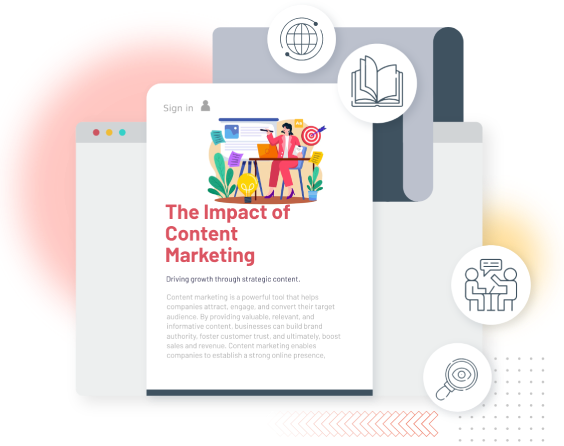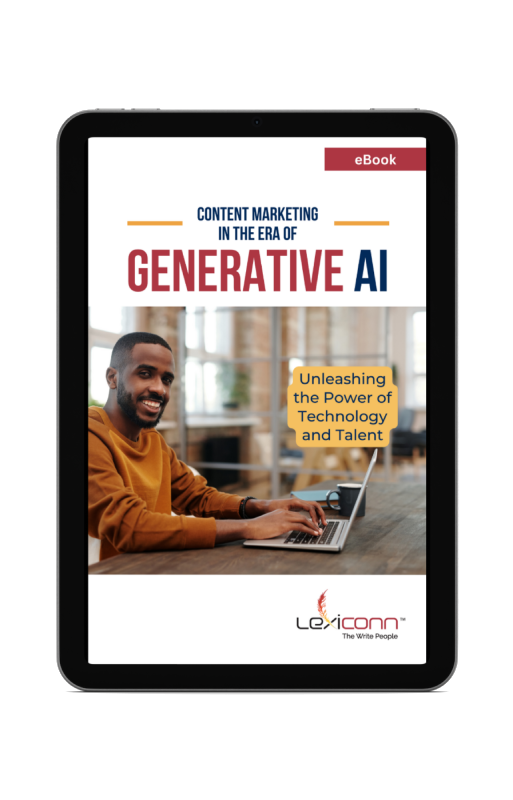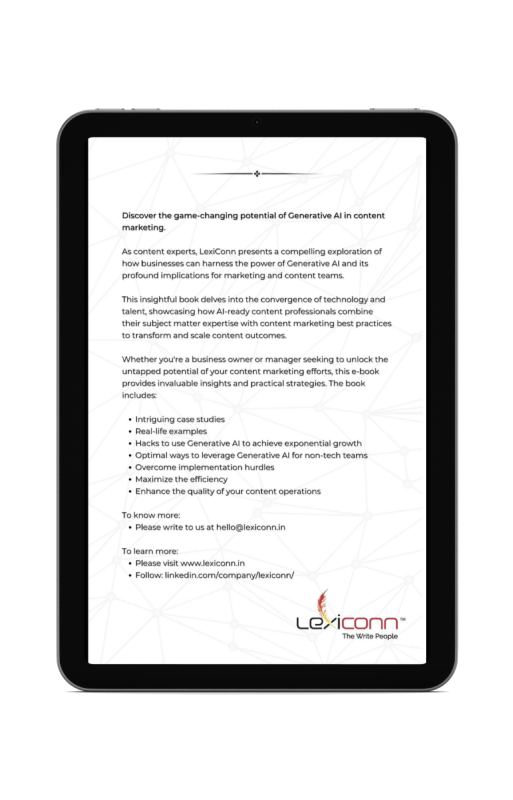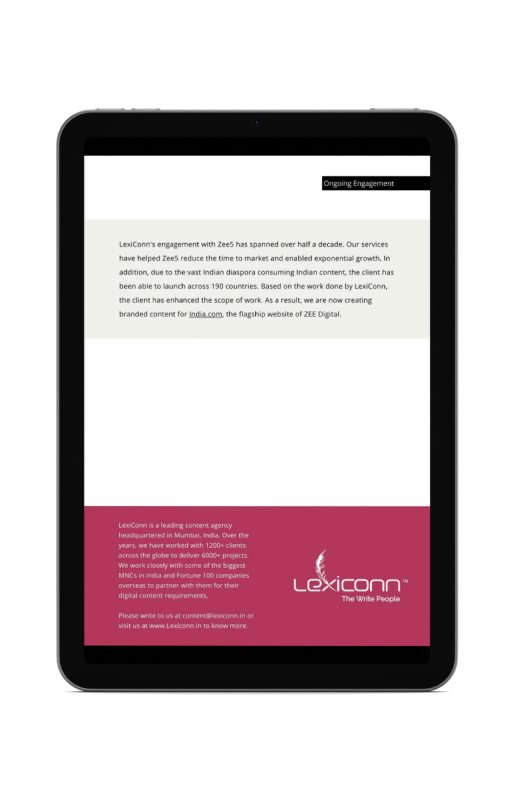

In the bustling world of digital marketing, where every brand is vying for attention, content remains king. But here’s the twist: the throne is no longer occupied by generic, mass-produced content. Today, the crown belongs to smart content—personalized, data-driven, and powered by AI content tools.
Let me paint a picture for you. A mid-sized travel agency struggling to keep up with competitors decided to experiment with AI tools for content creation. They used an AI-powered platform to analyze customer data and create hyper-personalized travel itineraries, blog posts, and email campaigns. The result? A 50% increase in customer engagement and a 30% boost in bookings within three months.
This isn’t magic—it’s the power of machine learning and automated content at work. At LexiConn, we’ve seen firsthand how AI is reshaping the content marketing landscape. As a leading content writing company, we specialize in crafting strategies that not only resonate with audiences but also drive measurable results.
In this blog, we’ll dive deep into how AI is transforming content marketing, explore the best AI tools for content creation, and show you how LexiConn can help you leverage these technologies to create smart content that engages and converts.
AI is not just an add-on to content marketing—it’s becoming a core strategy. Companies use machine learning algorithms to analyze consumer behavior, predict trends, and automate content production. Some key applications include:

Imagine walking into a store where the salesperson knows your name, your preferences, and even your favorite color. That’s the level of personalization AI brings to content marketing.
By analyzing user data—such as browsing history, purchase behavior, and social media interactions—AI can create highly personalized content experiences. For instance, Amazon uses AI to recommend products based on past purchases, while Spotify curates playlists tailored to individual music tastes.
In content marketing, tools like HubSpot and Salesforce use machine learning to deliver personalized email campaigns, blog recommendations, and even dynamic website content. This level of personalization not only boosts engagement but also fosters brand loyalty.
Creating high-quality content consistently is a challenge for even the most seasoned marketers. Enter automated content tools like Jasper, Writesonic, and Copy.ai. These platforms use natural language processing (NLP) to generate blog posts, social media captions, product descriptions, and more.
For example, an e-commerce brand can use AI to create thousands of unique product descriptions in minutes, freeing up time for marketers to focus on strategy and creativity. While AI-generated content isn’t a replacement for human creativity, it’s a powerful tool for scaling content production without compromising quality.
Search engine optimization (SEO) is the backbone of any successful content strategy. But with search algorithms constantly evolving, staying on top of SEO trends can feel like a never-ending battle.
AI-powered tools like Surfer SEO, Clearscope, and Frase are changing the game. These platforms analyze top-performing content in your niche and provide actionable insights to improve your rankings. From keyword suggestions to readability improvements, AI ensures your content is optimized for both search engines and human readers.
What if you could predict which topics will trend next month or which content formats will resonate most with your audience? With machine learning, this is now possible.
Predictive analytics tools like BuzzSumo and Crayon analyze historical data to identify emerging trends and predict content performance. For instance, if data shows that video content is gaining traction in your industry, you can pivot your strategy to include more video-based content. This proactive approach keeps your brand ahead of the competition.
Creating great content is only half the battle; distributing it effectively is equally important. AI-powered platforms like Outbrain and Taboola use algorithms to recommend your content to users based on their browsing behavior.
For example, if a user frequently reads articles about sustainable living, AI can recommend your eco-friendly product blog to them. This ensures your content reaches the right audience at the right time, maximizing engagement and ROI.
While much of the focus in AI content marketing is on text, visual content is equally important. AI is now transforming how brands create and optimize visual assets like images, videos, and infographics.
How AI Enhances Visual ContentVisual content is highly engaging and often drives higher conversion rates. By leveraging AI-powered tools, brands can create visually stunning content at scale, ensuring consistency across all platforms.
As AI becomes more integrated into content marketing, ethical concerns around its use are growing. Brands must navigate these challenges to maintain trust and credibility with their audiences.
Key Ethical ConcernsTo further illustrate the impact of AI, let’s look at some real-world examples of brands successfully leveraging AI in their content marketing strategies.
Case Study 1: The Washington Post’s HeliografThe Washington Post uses an AI tool called Heliograf to automate news reporting. During the 2016 Rio Olympics, Heliograf generated hundreds of articles on sports results, freeing up human journalists to focus on in-depth stories. This not only increased content output but also improved audience engagement.
Case Study 2: Sephora’s ChatbotSephora’s AI-powered chatbot offers personalized beauty recommendations based on user preferences and past purchases. The chatbot engages customers with quizzes and tutorials, driving both online and in-store sales.
Case Study 3: HubSpot’s Content Strategy ToolHubSpot uses AI to analyze content performance and recommend topics that resonate with their audience. This data-driven approach has helped them consistently rank high on search engines and maintain a loyal readership.
The rise of AI has given birth to a plethora of tools designed to streamline content creation and marketing. Here are some of the best ones:
1. Jasper (formerly Jarvis)Jasper is an AI writing assistant that uses GPT-3 technology to generate high-quality content. From blog posts to ad copy, Jasper can handle it all. It’s particularly useful for businesses looking to scale their content production.
2. GrammarlyGrammarly is a must-have tool for any content creator. It uses machine learning to identify grammar, spelling, and tone issues, ensuring your content is polished and professional.
3. Surfer SEOSurfer SEO is an AI-powered tool that helps optimize content for search engines. It provides real-time suggestions for improving keyword usage, readability, and overall SEO performance.
4. Canva’s Magic WriteCanva’s Magic Write is an AI text generator that helps create compelling copy for presentations, social media posts, and more. It’s perfect for businesses looking to enhance their visual content with engaging text.
5. ChatGPTOpenAI’s ChatGPT is a versatile tool that can assist with everything from brainstorming ideas to drafting entire articles. Its ability to understand context and generate coherent responses makes it a valuable asset for content creators.

For brands looking to integrate AI into their content marketing, here are some practical steps:
However, it’s important to remember that AI is a tool, not a replacement for human creativity and intuition. The best content strategies combine the efficiency of AI with the empathy and insight of human marketers.
AI is reshaping AI content marketing by making it smarter, faster, and more personalized. From AI content generation to machine learning-powered analytics, businesses can enhance their AI content marketing strategies with AI-driven solutions. While AI streamlines operations, the human touch remains essential for storytelling and creativity.
By leveraging AI wisely, brands can create meaningful AI content that resonates with their audience and drives engagement. Ready to take your content marketing to the next level? Visit us at www.lexiconn.in or drop us a line at [email protected]. We also offer a free 30-minute content consultation session to help you craft a winning content marketing strategy in 2025.



I have read and accept the Privacy Policy
Read More